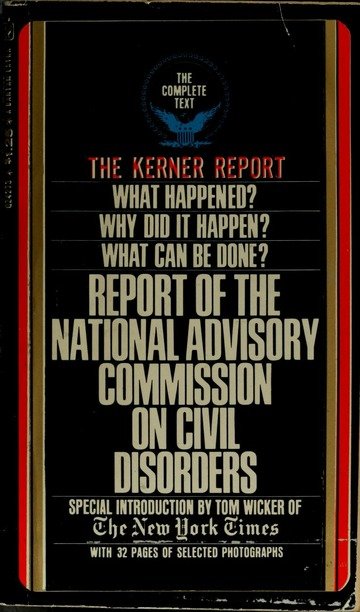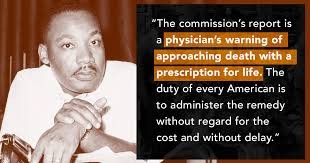Cover of the Book Version of the Kerner Commission Report
Quote from Dr. Martin Luther King, Jr. About the Kerner Commission Report
In July of 1967, deadly racial disturbances (also referred to as riots or uprisings) took place in Newark, NJ and Detroit, MI. Along with similar events in previous summers in Los Angeles, Chicago, and several other cities, the events of July 1967 gave rise to the National Advisory Commission on Civil Disorders also known as the Kerner Commission. The members of the commission did extensive research into three basic questions: What Happened? Why Did It Happen? and What Can Be Done? Their detailed findings were subsequently published in book form that became a national best seller. Dr. King was so impressed with the report’s recommendations that he compared them to a life threatening diagnosis for our nation along with a life saving prescription for healing. The most famous quote from the report is still a warning for us today:
This is our basic conclusion: Our nation is moving toward two societies, one black, one white—separate and unequal.
In addition to highlighting the nation’s deepening racial polarization that threatened our democratic values, the commission offered hope for progress toward real equality:
“To pursue our present course will involve the continuing polarization of the American community and, ultimately, the destruction of basic democratic values.
The alternative is not blind repression or capitulation to lawlessness. It is the realization of common opportunities for all within a single society.
This alternative will require a commitment to national action — compassionate, massive and sustained, backed by the resources of the most powerful and the richest nation on this earth. From every American it will require new attitudes, new understanding, and, above all, new will.”
The report went on to clearly articulate the reality of systemic racism and specific ways of advancing economic, racial, and social equality for all people. Unfortunately most of the commission’s recommendations were ignored or lacked long term follow up, because they challenged the status quo and would require major financial and systemic changes. Fifty five years after the summer of 1967, we are still living with the consequences of deepening racial polarization and widening racial gaps in wealth, healthcare, housing, and education. Yet the Kerner Commission’s findings still offer a way forward if we can summon the will to do so. As people of faith this is especially important, because of our commitment to the sacred worth of every person. The video posted below features Senator Fred Harris, the last surviving member of the Kerner Commission. Take a few minutes to watch the video and reflect on his words based on experiences of 55 years ago and today.


